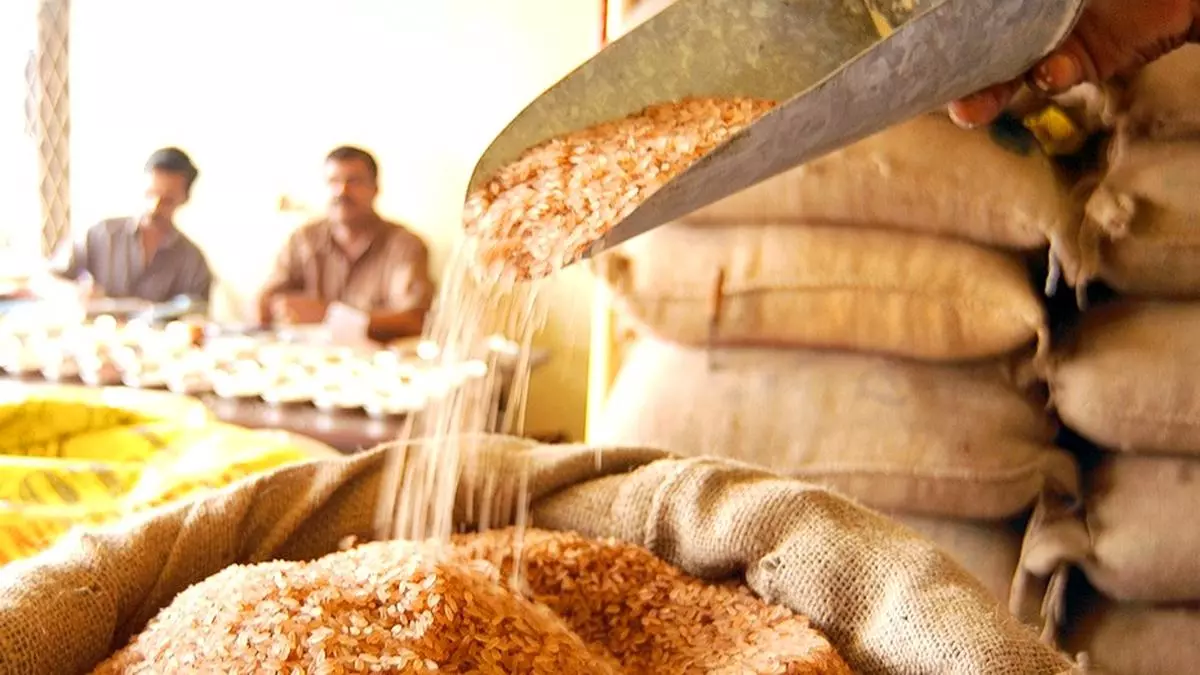Customs imposes penalties on 2 firms for irregularities in organic rice exports
The Indian Customs Department, an arm of the Finance Ministry, has imposed a fine of ₹75 lakh on two exporters for “misleading” authorities by trying to ship out non-basmati white rice as organic non-basmati white rice.
In an order passed last month (a copy is available with businessline), the Commissioner of Customs (Appeals) also imposed an additional fine of ₹95 lakh on Reliteaur Foods Private and ₹65 lakh on Elite Agro Specialities for the violation. Both exporters have been asked to pay ₹95 lakh and ₹65 lakh to avoid confiscation of their cargoes of 25,500 tonnes and 16,700 tonnes, respectively.
However, industry experts feel Customs authorities should have acted more sternly and the penalties were lighter that they could have imposed.
Consignments detained
The Commissioner of Customs (Appeals) issued the order after consignments of both exporters on board merchant vessels Della and SW South Wind-I were detained by the Customs along with the ships. Customs officials arrested the shipments on suspicion that non-basmati white rice, which was banned from July 2023 to September 2024, was being exported as organic non-basmati rice.
On August 12, businessline reported alleged irregularities in organic rice exports after their shipments during April-July 2024 exceeded the shipments during the entire 2023-24 fiscal. Questions were raised over the buyers, mainly African countries, and the price of the shipments.
In his order, additional commissioner Vishwajeet Singh said he was taking a lenient view on redemption fines as each of them was paying a “heavy” detention and demurrage charges of ₹17 lakh per day for vessels being held up at the Kandla port.
Singh said he found that the exporters had indulged in “mis-declaration of goods by declaring Non-Basmati white rice as Organic Non-Basmati Rice (white rice)” rendering their goods, totally valued at ₹165.34 crore, liable to confiscation under the provisions of Section 113(d) of the Customs Act, 1962.
APEDA’s role
Stating that Customs had allowed exports based on “provisional” transaction certificates the exporters got from the Sikkim State Organic Certification Agency (SSOCA), authorised by the organic exports nodal agency Agricultural and Processed Food Products Export Development Authority (Apeda).
Apeda confirmed SSOCA issuing the provisional transaction certificates to both exporters, which was valid when the shipping bill was filed. However, on September 19, Apeda informed the Customs Department that the certificate issued to them had been withdrawn for two years.
The additional commissioner accepted the exporters’ argument that the certification was valid when they filed for shipping. He said Apeda did not provide a copy of the order despite various emails.
On September 30, the Apeda Chairman wrote that based on the detailed investigation of the issue, the consignments were found to be conventional rice. Referring to exporters’ request to file fresh documentation to export the product as conventional non-Basmati rice, the Apeda Chairman urged the additional commissioner to consider it as the shipments were no longer classified as organic.
‘Serious violation’
However, Singh said the exporters had admitted that their consignments were of conventional rice, owing to the fumigation done while loading in the vessel. And based on these evidences, it had been established that the cargo of non-Basmati white rice had been mis-declared in the shipping bills as “organic non-basmati rice (white rice)”.
Industry experts pointed out that a provisional certificate is not a final one. Declaring a product organic based on a provisional certificate does not guarantee it is correct and hence the Customs authorities should not have considered the provisional transaction certificate.
They said Apeda authorities had failed to take action against the exporters despite initially complaining of “serious violation” of the regulations. They also wondered why Apeda authorities asked Customs authorities and the Directorate-General of Foreign Trade (DGFT) to consider the issue.
The experts said the Customs Department has issued its orders on the exporters’ appeal without a copy from the National Accreditation Board (NAB), which is responsible for accreditation, evaluation and implementation of accreditation programmes for certification bodies.
“As per Apeda’s letter, it undertook a detailed investigation. Why did it not share the NAB order copy with the Customs?” wondered an expert, who did not wish to be identified.
Weak adjective
The expert alleged that Apeda was secretive about its investigation report. “The lack of transparency of Apeda is affecting the system. For example, the US Department of Agriculture and the European Union systems are very much open about issues and orders,” the source said.
Others wondered how the exporters could be allowed to change the description of their consignments from organic to non-organic. “How can the nature of cargo change? What would have they done had the Centre continued the curbs on exports of white rice?” asked a second expert.
Industry experts found fault with the Customs order coming up with a weak adjective “appeared” when the case was conclusive and wondered if it was done to “deliver a weak order”.
Economic crime?
Pointing to the order stating that the exporters had “deliberately mis-declared” the cargo, they said such “misdeclarations” are equivalent to “deception and fraud”. “Is it not an economic crime?,” wondered a second expert.
Referring to the Customs order that the shipments were cleared based on the transaction certificates issued by SSOCA, traders said the exporters seemed to be blaming the issue of provisional transaction certificates for their “misdeclaration”.
The second expert said huge quantities of white rice had been exported as organic rice and government agencies should hold a detailed probe.
Industry expoerts wonder if the Customs order is blaming Apeda for the fiasco and taking a lenient view. “Will the organic rice case also get buried like the scam in cotton and sugar?” the first expert asked.
